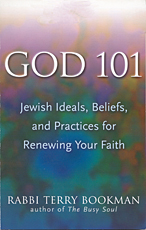Rabbi Terry Bookman is Senior Rabbi at Temple Beth Am in Miami, Florida, and frequently lectures to community groups and religious leaders of all faiths. He is the author of The Busy Soul. He has a knack for explaining in clear and practical terms the spiritual practices that make for a rich and fulfilling life.
In this inspiring paperback, Rabbi Bookman outlines the essentials of Judaism by answering eight basic questions posed by seekers and then exploring four pathways to God: the path of heart (prayer), the path of head (study), the path of hands and feet (activism), and the path of soul (relationships). He speaks for many seekers when he says, "We are open to a faith that can be a-rational but not irrational, and community that is nurturing and supportive without being stifling. Having sensed the possibilities of a holistic approach to living, we are unwilling to bifurcate our lives. We insist on keen intellectual honesty and an openness to truth, no matter what the source. We are tired of religion that is somber, childish, chauvinistic, or shallow; we want to be challenged and uplifted, to feel the joy and celebration of faith and tradition, to be guided on a path that can speak to us each and every day."
The Torah offers much wisdom that can be applied to ethically charged situations. For example: "In the Torah we find this amazing passage that asks the question 'What do you do if you find a murdered body in a field, away from any town or settlement?' Well, after taking care of the corpse, the elders of the nearby towns measure the distance to the closest village. Everyone there must contribute to the burial of the body. After that, they must bring a communal guilt and sin offering for allowing such an act to take place and not doing enough to prevent it. Compare that to the nightly parade of victims in our own city streets, about which we merely shrug our shoulders and add up the body count The notion that we all bear responsibility and may be punished for the sins of others is found throughout the Jewish tradition, especially in the liturgy of the High Holy Days."
What an astonishing passage! It speaks volumes about the difference between a spiritual approach to a problem and that of a thoroughly secular one, where everyone just watches out for him- or herself and a small circle of friends. We also found the following exercise to be very practical and helpful:
"In one of the workshops I do, I give people a blank calendar and ask them to fill in their typical week. As we begin to analyze their daily activities, I have them write down the letter O next to any action taken on behalf of another. You might want to try this yourself. Each O represents a spiritual act. Anytime we do something in which another person benefits, we are doing God's will, becoming an agent of the divine purpose. Every time we work to make the world a better place in which to live, we are being truly 'religious' people . . . God's silent partners completing the task of creation each and every day."We all need help seeing how each of our deeds has significance in the divine scheme of things, and such an exercise can enable us to become more intentional in our service of others. Rabbi Bookman, as usual, hits the mark again and again with his suggestions on living a spiritual life.
